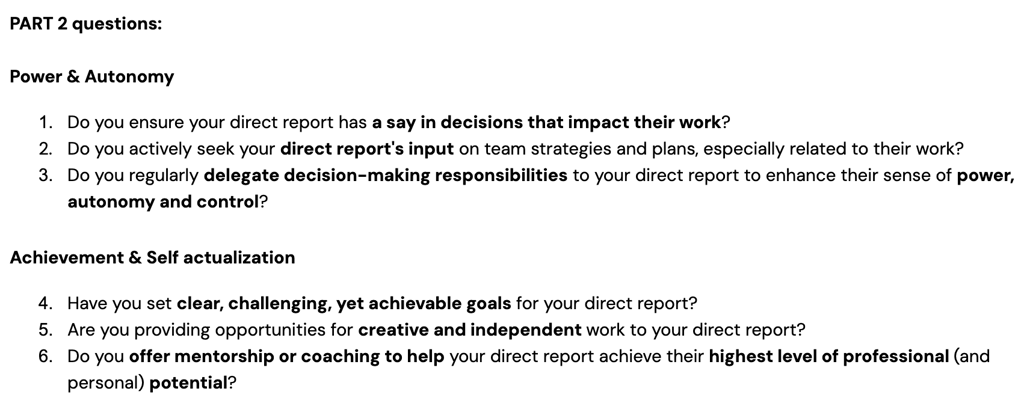So, Part 2 of why your direct report is feeling demotivated is done!
Based on your answers to the previous questions, below you will find suggested next steps and guidance on what would be best to do next.
Good luck!
In the previous 6 questions, you were asked about your direct report's higher needs, such as autonomy, power, achievements, ambition, and self-actualization.
The idea of higher needs at work has been discussed by multiple scientists such as Abraham Maslow, David McClelland, Henry A. Murray, and Daniel H. Pink.
You are here in this guide because one or more needs of your direct report might not be met.
Power & Autonomy needs analysis:
Achievement & Self-actualization needs analysis:
To some leaders, a question may arise: why does one desire power or autonomy?
The pursuit of power and autonomy at work is primarily driven by an individual's need for self-determination and control over their own destiny rather than a desire to exert control over others. This inclination towards autonomy is linked to positive outcomes such as increased job satisfaction, creativity, and productivity. Autonomy allows employees to feel valued and engaged, enhancing their overall job performance. Research suggests that experiencing power as a means to achieve autonomy is a more significant motivator than the desire to influence others (Psychology Today, 2021; Columbia Business School, 2016)
What can you do about it?
Encourage Participation: Actively invite and encourage your direct report to share their opinions and ideas in meetings and discussions. This demonstrates that you value their input and expertise.
Delegate Decision-Making: Start by delegating smaller decisions to build trust and confidence. This empowers your direct report and helps them develop decision-making skills.
Seek Input Regularly: Regularly consult your direct report on decisions, especially those directly affecting their work. This can be done through one-on-one meetings or written communication.
Provide opportunity: Find ways to provide opportunities for your direct report to manage a project or take upon an individual challenge/initiative.
To some leaders, a question may arise: why does one desire achievement & self-actualization?
The desire for achievements, ambition, and self-actualization at work is deeply rooted in human motivation theories. According to McClelland's Theory of Needs, individuals are driven by the need for achievement, which involves setting challenging goals and experiencing satisfaction from accomplishing them. This aligns with Maslow's Hierarchy of Needs, where self-actualization stands as the highest level, representing the fulfillment of one's potential and capabilities. Research has shown that these motivational drivers are crucial for personal satisfaction, workplace engagement, and overall well-being (McClelland, 1961; Maslow, 1943)
What can you do about it?
Encourage Participation and Creativity: Invite direct reports to contribute ideas and participate in decision-making. Delegate meaningful tasks that allow for creative and independent work.
Goal Setting and Development Plans: Collaborate to set clear, achievable goals, yet challenging goals. Create personalized development plans focusing on professional and personal growth.
Mentorship and Support: Offer regular mentoring or coaching sessions for the elevation of skills and competencies. Provide resources and support for achieving challenging goals and encourage continuous learning and unlocking maximum potential.
Now, try to ensure these higher needs factors. If the demotivation continues - come back for Part 3.




